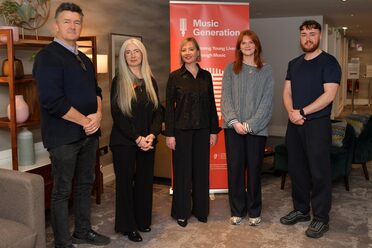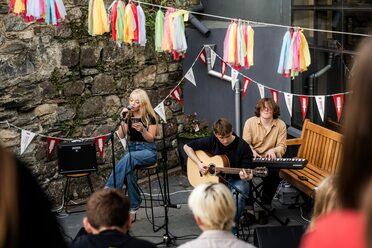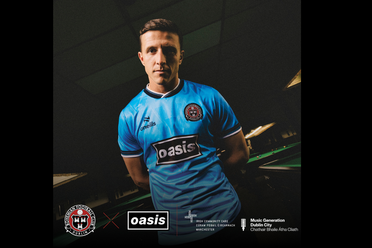Thursday 3 November 2016, Dublin: A ground-breaking research document, which will be launched on Friday 4 November at the 6th Annual Conference of the Society for Music Education in Ireland, has revealed a new model for the provision of music education that can achieve powerful and positive outcomes for children and young people. The document, titled ‘Possible Selves in Music’, challenges traditional thinking about music education, uncovers an entirely new approach and opens up a wealth of knowledge to all who are interested in bringing music into children’s and young people’s lives. The title of the research comes from the concept that when children and young people connect with music, they begin to imagine their own possible future self and this leads to real transformation in their self-development.
As Ireland’s national music education programme, Music Generation seeks to transform the lives of children and young people through access to high-quality vocal and instrumental tuition (also known as performance music education). Working through local Music Education Partnerships, the programme provides children and young people with a multitude of different ways to engage with music.
Commenting on the research, National Director of Music Generation, Rosaleen Molloy said: “‘Possible Selves in Music’ reveals rich and valuable information about how children and young people flourish when they connect with music. We now know that children and young people engage with music learning to enrich their lives in a range of different ways. ‘Possible Selves’ is a useful concept to capture the various ways that they imagine music will be part of their lives in the future.”
‘Possible Selves in Music’ is the outcome of a two-year research partnership between Music Generation and St Patrick’s College Drumcondra (now DCU). The research, which will be of significant interest to musicians, educators, policy-makers, youth workers, and national and local government agencies at home and overseas, was commissioned by the Board of Music Generation in 2013 and carried out by Postdoctoral Research Fellow Dr Thomas Johnston, who worked with Principal Investigator to the project Dr Patricia Flynn (DCU/St Patrick’s College).
Through in-depth, in-the-field engagement with the partnerships involved in Music Generation at local level, the research sought to investigate how the programme is enabling thousands of children and young people to reach their potential and experience transformation through music. The research demonstrated how Music Generation does not take a ‘one-size-fits-all’ view – instead it values all approaches, music traditions, practices and intentions for learning. Music programmes are developed locally in response to particular needs and context, and children and young people are enabled to engage with music in ways that are powerful and meaningful for them.
Principal Investigator, Dr Patricia Flynn, said: “In our research, what struck us most about Music Generation was the breadth of its vision for performance music education. As a country we have been waiting for this type of initiative for a long time, it could be said since the 1930s. We are fortunate that when Music Generation was established it benefited from new ways of thinking. On the one hand it is influenced by philanthropy and on the other by a contemporary understanding of the role of music in people's own lives, in building communities, in engaging youth and in connecting with those on the margins. This is also of real interest to other European countries who are currently trying to turn around their own music services which were set up in an earlier time. What is radical about Music Generation is that it is not owned by one set of music values. The research provides a way of capturing and understanding this and it will have far reaching effects on the way we think about performance music education in Ireland and beyond.”
What has been revealed through the research is a new way of thinking about performance music education that looks beyond one single system of learning. By looking closely at how Music Generation works ‘in-the-field’, the researchers showed that a different and very innovative approach, which has flexibility and diversity at its core, is the key to the programme’s success.
Crucially, the research tells us that this diversity of approach works only when all partners involved are working together to achieve a shared goal. From its philanthropic donors, to national and local funders, administrative teams, community groups, schools, parents and musicians, the overarching, aligning vision of Music Generation is to leverage the best possible outcomes for children and young people, musically, personally and socially, within vibrant communities which have music as part of their fabric.
‘Possible Selves in Music’ tells us that –
-
Music Generation has been made possible because of an entirely new approach to establishing an infrastructure for performance music education that seeks to be inclusive and accessible
-
It has evolved by not taking a ‘one-size-fits-all approach’, but rather by embracing a diversity of approaches where different traditions and practices are valued
-
The term ‘Possible Selves’ helps Music Generation to articulate the breadth of its vision for children and young people through music. That is, to leverage the best outcomes for children and young people through music and to enable them to imagine and realise the different ways that music will be part of their lives in the future.
-
There are different approaches to music learning which are appropriate to different contexts, some of which may sometimes overlap. Recognising all of these various approaches will help musicians to notice them in their own practice and understand the intentions of other musicians and cultures
-
Musicians have a vital role in supporting the development of children and young people’s ‘possible selves’ in music
-
Active and dynamic partnerships are vital to Music Generation and are the means through which local and national infrastructure for performance music education is built
The Research Board for this landmark project comprised Dr Patricia Flynn (DCU/St Patrick’s College); Rosaleen Molloy (National Director, Music Generation); Prof Stephanie Pitts (University of Sheffield); and Prof Emer Smyth (ESRI).
Rosaleen Molloy noted that: “This research would not have been possible without the commitment and engagement of our many partners, including the local Music Education Partnerships with whom we work closely. I would like to thank them for their willingness and contributions which will benefit the future development of music education in Ireland and beyond.”
The full ‘Possible Selves in Music’ research document as well as a summary publication are available to download free of charge from our website.
Established by Music Network in 2009 on receipt of a €7 million donation from U2 and The Ireland Funds, Music Generation is co-funded by U2, The Ireland Funds, the Department of Education and Skills and Local Music Education Partnerships (MEPs). Currently Music Generation reaches more than 38,000 children and young people each year, providing local access to music tuition in 13 areas of Ireland and creating over 330 employment opportunities.
//ENDS
Media information: Helen Shyne, Strategic Communications Manager, Music Generation
t: +353 1 475 8454
m: +353 85 741 5171
e: aoife@musicgeneration.ie




